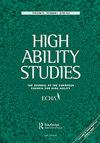College students with high abilities in liberal arts disciplines: Examining the effect of spirituality in bolstering self-regulated learning, affect balance, peer relationships, and well-being
IF 1.3
4区 教育学
Q2 EDUCATION, SPECIAL
引用次数: 0
Abstract
ABSTRACTThis article reports a study on the impact of online spiritual lessons in improving self-regulation, emotion regulation, affect balance, peer relations, and well-being of high-ability college students of liberal arts disciplines. Compared to an online workshop on affect management, the online spiritual lessons were effective. Moderate effects were observed on the cognitive reappraisal and expressive suppression facets of emotion regulation andautonomy, environmental mastery, personal growth, positive relations, purpose in life, and self-acceptance subscales of well-being. Fairly high effects were observed on peer relations, self-regulation, affect balance, and general/overall well-being outcomes. Gender, economic class, study subject, primary caregivers, living arrangements, attending extra lessons/having club memberships for advanced studies, and intervention compliance were significant predictors of intervention impact. Latent class analyses revealed eight classes/subgroups of participants reporting maximum posttest (T2) gains: male students, middle class, students of mathematics, literature, philosophy, who were attending extra lessons/having club memberships for advanced studies, who attended above threshold (51–90 or > 56%) online spiritual lessons, and who did above threshold homework lessons. Male students and those with high intervention compliance reported gains on all outcomes. Online spiritual lessons can be incorporated into socio-emotional leaning for high-ability collegians.KEYWORDS: Self-regulated learningaffect balancepeer relationshipswell-beinghigh-ability college studentsspirituality Disclosure statementNo potential conflict of interest was reported by the author(s).文科高能力大学生:灵性在促进自我调节学习、影响平衡、同伴关系和幸福感方面的作用
摘要本文研究了网络灵修课程对文科高能力大学生自我调节、情绪调节、情感平衡、同伴关系和幸福感的影响。与情感管理的在线研讨会相比,在线精神课程是有效的。在情绪调节和自主性、环境掌握、个人成长、积极关系、生活目的和自我接受的认知重评价和表达抑制方面,观察到适度的影响。在同伴关系、自我调节、情感平衡和总体/整体幸福感结果方面观察到相当高的效果。性别、经济阶层、研究对象、主要照顾者、生活安排、参加额外课程/参加高级学习俱乐部会员和干预依从性是干预影响的显著预测因素。潜在班级分析显示,八个班级/亚组的参与者报告了最大的后测(T2)收益:男性学生,中产阶级,数学,文学,哲学学生,参加额外课程/高级学习俱乐部会员,参加超过阈值(51-90或> 56%)的在线精神课程,以及超过阈值的家庭作业课程。男性学生和那些高干预依从性的学生报告了所有结果的收益。在线精神课程可以被纳入高能力大学生的社会情感学习。关键词:自我调节学习影响平衡同伴关系幸福感高能力大学生灵性披露声明作者未报告潜在利益冲突
本文章由计算机程序翻译,如有差异,请以英文原文为准。
求助全文
约1分钟内获得全文
求助全文
来源期刊

High Ability Studies
Multiple-
CiteScore
4.80
自引率
11.10%
发文量
7
期刊介绍:
High Ability Studies provides a forum for scholars in a variety of disciplines associated with the development of human abilities to their highest level. It is a medium for the promotion of high ability, whether through the communication of scientific research, theory, or the exchange of practical experience and ideas. The contents of this journal are unique in reflecting concerns and recent developments in this area from childhood and across the whole life span in a variety of contexts. Far from being restricted to the traditional focus on high-level cognitive development, it also presents investigations into all other areas of human endeavour, including sport, technology, the arts, business, management and social relations.
 求助内容:
求助内容: 应助结果提醒方式:
应助结果提醒方式:


